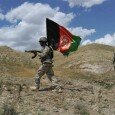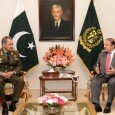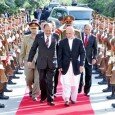By Syed Hussain Shaheed Soharwardi –
Pakistan’s troubled relations with us
Pakistan and the US are local partners in global war on terror, will it or not, admit it or not. They could not be otherwise. Help is what Washington wants- when and how it decides that help is needed. The deterioration in relations between US and Pakistan gained momentum, mainly because of the incidents of Salala check post, Abbotabad operation, and Raymond Davis case.
In response to these incidents, distasteful to the Pakistani nation, on April 12 this year, Pakistan National Assembly unanimously approved a new set of guidelines on relations with the US. It is evident from the tone of the terms of engagement drafted by the Parliamentary Committee on National Security that the relations between Pakistan and the US have changed drastically.
Pakistan is finally being assertive in this relationship where it has always remained at a disadvantage in the past. Salala provided us with an opportunity to air our grievances, especially the loss of prestige after Operation Geronimo (killing of Osama Bin Ladin), and punish the US for its characteristic highhandedness. Closing the NATO supply line was a bold move unexpected from Pakistan but there is a fine line between bold and bull headed. Closing off all avenues of dialogue is not the most feasible course of action Pakistan can take right now, Pakistan needs the US as much as the US needs Pakistan.
Boycotting international fora such as the Bonn Conference does not take Pakistan any closer to resolving its differences with the US; it only aggravates the situation further. Pakistan needs to articulate a logical response and list its objections categorically instead of bleating on about its sovereignty like a petulant child. However, it is surprising to note that where complying to the US demands did not do Pakistan any favours, an aggressive response to the US adventurism, has won Pakistan major points and is keeping the US on its toes.
Before agreeing to a course of action for the future, institutions within Pakistan need to get on the same page, for example the point about military adventurism in Pakistani territory by NATO forces and drone strikes has been mentioned in the guidelines on terms of engagement as totally unacceptable. This is a valid demand. However, politico-military establishments of both the US and Pakistan are in agreement that drone strikes are an effective tool in eliminating Taliban threat.
Opening the NATO supply routes cannot be made conditional upon cessation of drone strikes if both parties agree that drones work. Speaking at the Woodrow Wilson International Center for Scholars in Washington DC, White House counterterrorism adviser John Brennan said, “There is nothing in international law that bans the use of remotely piloted aircraft for this purpose or that prohibits us from using lethal force against our enemies outside of an active battlefield, at least when the country involved [Pakistan] consents or is unable or unwilling to take action against the threat.” In Brennan’s statement, giving consent or unwilling to take action against the terrorists means Pakistan’s ‘yes’ to the US administration on drone strikes. Then how come halting of strikes is linked with the restoration of NATO supply? It is self contradictory.
Diverging and contradicting views within the Pakistani establishment about drone strikes can only create more problems in the future. We also need to understand that the drone campaign had pushed Al-Qaeda, with its slain leader Osama bin Laden claiming it to be “disaster, disaster” in documents seized from the Abbottabad hideout where he was killed by US Special Forces a year ago. On the other hand, US wants restoration of NATO supply via Pakistan preferably before the May 21-22 summit of the NATO leaders in Chicago.
In redefining the terms of engagement between the US and Pakistan, the Foreign Office for the first time is asserting its authority and has made it clear that it will not let the military dictate foreign policy anymore. However, the military will not back down easily on this, keeping in view the Pakistan Army’s rule for more than 33 years in Pakistan’s history.
It has been mentioned in the guideline that all agreements and MOU’s about Pakistan’s national security must first make the rounds of the relevant ministries, federal cabinet, ministry of law, justice, & parliamentary affairs and the foreign ministry. The military will not appreciate this meddling into its affairs of defense and will probably carry on with covert operations which have also been forbidden. The military should be consulted in foreign policy matters. However, in a democratic set up, dictation to the Foreign Office is not possible.
On international level, one finds as if the Pakistan’s military is taking head-on with the US as there has been a steep downward slide relationship between the military establishments of the two countries. The Salala border deaths were the latest in a series of incidents over the last 18 months that severely damaged US-Pakistan Army relations. The killing of two alleged Pakistani assailants by CIA security officer Raymond Davis in Lahore in January 2011 and the US Navy SEAL raid that killed Osama bin Laden in Pakistan in May, without Pakistani permission, also contributed to the decline. All the three incidents have been very strongly taken up by the Pakistan Army. An apology by the US administration vis-à-vis Salala deaths is an apple of discord between them. Pakistan’s complacency in the past was not taken seriously.
But the Salala incident’s results in shape of halting NATO supply and packing up of the US forces stationed in the Shamsi airbase have forced the US administration to take Pakistan seriously. Visits by Secretary Hilary Clinton and anxious-to-visit-Pakistan, Mark Grossman can be cited as examples here. Their leniency in their tone and language means business. However, Pakistan Army must grasp the opportunity. Sticking to a stance may make them missing a great opportunity.
The resolutions, adopted by the Parliament of Pakistan in redefining the terms of engagement, reaffirms Pakistan’s commitment to combat terrorism, as it is essential for the survival of Pakistan’s economy and military strength vis-à-vis terrorists, which is based upon the foreign assistance. If the deterioration of relations is stretched, this may cost us the US $1.5 billion worth of aid, keeping in view that we are in the month of Pakistan’s federal budget. Nations stretch crisis for their benefits, not for incurring losses.
Pakistan should explore other economic avenues if it wishes to wean off of US aid. The biggest leverage the US has over Pakistan at the moment is the economic and military aid it gives to Pakistan. For Pakistan, it might be peanuts compared to the economic loss incurred by the War on Terror but it is high time Pakistan strengthened its economic ties with the rest of the world. Demanding greater access to markets in NATO countries is the best way to jumpstart the economy. However foreign investment in Pakistan also needs to be promoted. Promoting relations with China, Russia, Iran and India and strengthening economic ties with the Central Asian republics, ASEAN, GCC, and SCO are practicable options for fiscal growth.
With the inclusion of clauses such as developing gas pipeline project with Iran, Pakistan has formulated a policy which is unprecedented. It might cause the blockage of aid to Pakistan, because whenever Washington requires Islamabad’s support to achieve its geopolitical goals in the region, it does not hesitate to extend military and non-military assistance to Pakistan. But whenever Pakistan shows reluctance in fulfilling USA’s goals and objectives, the easiest way to punish Pakistan is to hit its economy by imposing sanctions like Pressler Amendment, Solarz Amendment or Symington Amendment. Some of the political analysts believe that the new terms of engagement of Pakistan with the United States are merely the extension of the previous policy with the adaptation of the word “new”.
Relations based on mutual respect, unconditional apology from US for their unjust actions, conditionally allowing NATO to use Pakistan as conduit for supplying arms to their forces, immediate cessation of drone attacks and demand of the equal treatment are the similar and the familiar clauses that have been made in the past but have proved of little effect. When I interviewed a few friends of mine for this write up, they said: ‘These resolutions are not more than words. Formulating these policies means healing the public temporarily. It is the start of new cooperation rather than confrontation’.
The parliamentary guidelines show that Pakistan means business, yet it is unlikely that these guidelines will be implemented practically. Pakistan may have the upper hand now but its obstinacy may have unforeseen consequences. The security of the region lies in the balance and a refusal to compromise on matters by both Pakistan and the US may further deteriorate the security situation in Afghanistan. Pakistan needs to carefully use the bargaining chips it has and choose its battles prudently.
Pakistan cannot sustain animosity of the US (on international front) and democracy (on domestic front) without transforming itself from a national security to a national welfare state. We need to normalize our relations with neighbors including India, Iran and Afghanistan. Anybody who is keen to redefine new terms of engagement with the United States without advocacy of an environment of peace and cooperation in South Asia may be talking futile and baseless. India and Afghanistan are perhaps the greatest hindrance in the way of a mutually beneficial and a reciprocally respectable relationship with our erstwhile cold war and currently War on Terror allies. As Chairman Mao of China said: “A fish can swim only in a friendly sea”, we need to normalize our relations with our neighbors. This will give us an impetus to deal with the US sternly and at par on our own terms.
All this worry, friction, and frustration characterizes the interaction of two imperfect entities—Pakistan and the US— fumbling to find productive patterns of cooperation. It is improbable, as this publicationmakes evident, that any single pattern will be set soon. The new terms of engagement reflect the difficulties of what might better be likened to drafting a marriage contract. The drafting has not been completed and probably never will be, but the union functions nevertheless.
The writer is Director South Asian Centre for International and Regional Studies (SACIRS) Peshawar [email protected]































































































